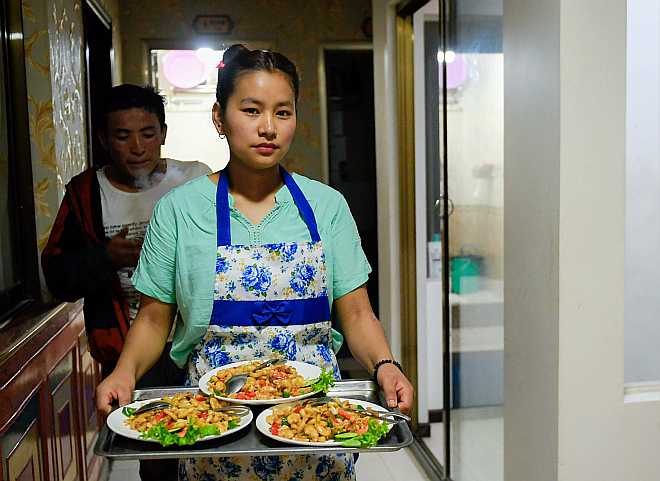
Photo taken on Aug. 12, 2018 shows a waitress of Norling Restaurant going to serve dishes with Nepalese flavors. Photo by Liu Dongjun
The Nepalese Norling Restaurant is a household name in Gyirong, a township on the border with Nepal in Gyirong County, southwest China's Tibet Autonomous Region.
In 2012, it was the first Nepalese restaurant to open in the township. Another seven Nepalese restaurants have opened over the past six years.
"Our restaurant is the most famous one due to its authentic and delicious Nepali food," said 29-year-old Mingma Tsomo Tamang.
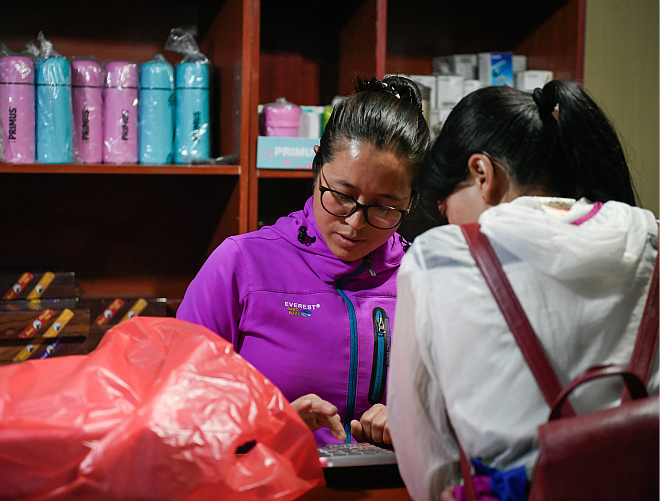
Photo taken on Aug. 12 shows Mingma (left), hostess of Norling Restaurant, selling Nepalese goods in the store. Photo by Liu Dongjun
She and her husband Deng Tamang come from the village of Thulo Shyabry, just three hours by bus from Gyirong. They previously ran a hostel in Kathmandu, the capital of Nepal, where they lived with their family.
An agreement between China and Nepal allows Chinese and Nepalese who live within 30 kilometers of the border to cross and trade freely.
"We heard that there were many opportunities to make money, so we came to Gyirong," said Deng Tamang.
At the beginning, their new life in China was not as hard as they imagined.
"The culture in Gyirong is similar to my hometown. It was easy to adapt to the local culture and our new life," Deng Tamang recalled. "What impressed me most was that the locals were so friendly and helpful. They helped us a lot in starting our business."
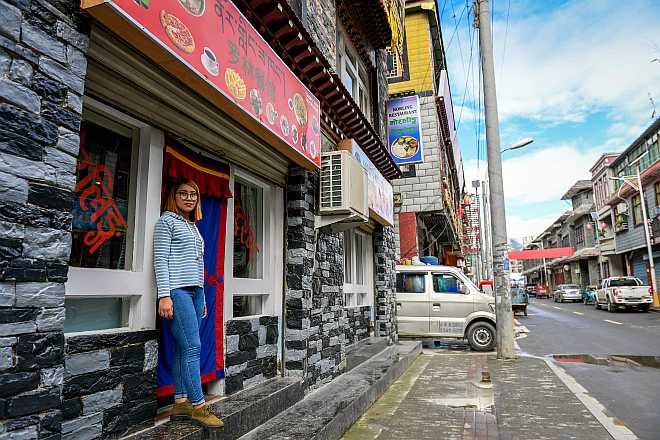
Waitress Pasang Wangmo poses for a photo taken at the entrance of Norling Restaurant in Gyirong Township, Shigatse City, southwest China's Tibet Autonomous Region, on Aug. 19, 2018. Photo by Liu Dongjun
The two-story Nepalese-style restaurant became a huge success as soon as it opened in the border town. It serves about 4,000 local residents and thousands of truck drivers who pass through day and night.
"Life is good here. It is a new start for my whole family," said Mingma Tsomo Tamang, mother of two children who live with her parents in Kathmandu where they attend primary school.
But the tranquil life changed after Gyirong was hit by a massive earthquake which devastated Nepal and some border areas in Tibet on April 25, 2015. The couple's restaurant was damaged by the disaster.
After the earthquake, the couple received subsidies of 20,000 yuan (about 2,900 U.S. dollars) from the local government to renovate their restaurant. Last year, the couple rented a two-room shop neighboring the restaurant to sell more than 40 kinds of Nepalese specialties such as rice, tea and wine, earning about 300,000 yuan a year.
"Everything is smooth now. Although I am busy with my business every day, I really enjoy it," Mingma Tsomo Tamang said. Apart from Nepali and Tibetan, she has learned English and Chinese to better communicate with customers from different places.
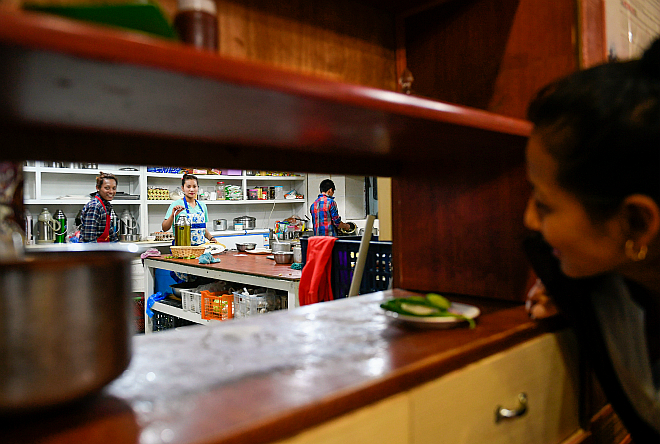
Photo taken on Aug. 12 shows a waitress (right) passing on meal needs of customers to chefs working in the kitchen. Photo by Liu Dongjun
The couple are among the 50 Nepalese doing business in the township.
After the 2015 earthquake, Zhangmu border crossing was closed due to damage and Gyirong has taken over the functions for about 90 percent of land trade between China and Nepal, according to Gyirong Customs.
By the end of 2017, there were 26 trade companies and seven customs clearance agents in the township. Every day, 100 trucks line up to take garments, fruit and electronic devices to Nepal and return to China with spices, handicrafts and medicine. A 12,000 square-meter market is also under construction in the town. It will have 100 booths for traders.
On Aug. 30 last year, the border crossing was opened to foreign nationals, which means travelers from countries other than Nepal and China can pass through the border.
"My restaurant and specialty shop businesses have been growing since last year as more foreigners are allowed to enter and leave Nepal and China here," said Mingma Tsomo Tamang.
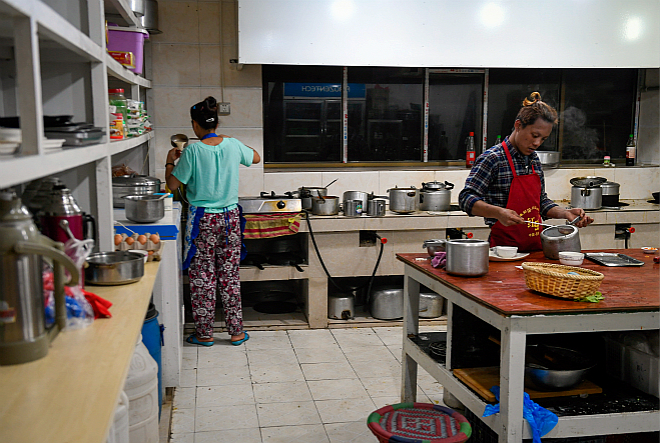
Photo taken on Aug. 12 shows chefs preparing dinner for customers in the kitchen. Photo by Liu Dongjun
In April, some of their siblings also came to Gyirong and opened their own specialty shops in the town. "There are more business opportunities," said 18-year-old Nurpu Sangbo Tamang, Mingma Tsomo Tamang's brother. "I hope to start my new life here."
In May 2017, Nepal and China signed a Memorandum of Understanding on cooperation under the framework of China's Belt and Road Initiative, which is aimed at enhancing bilateral cooperation on promoting connectivity of facilities, trade connectivity, financial integration and connectivity of peoples.
In June, the two sides agreed to build a railway connecting Kathmandu and Gyirong township, a significant step to jointly promote the initiative.
"For us, closer cooperation means more business opportunities. We will benefit a lot from that," said Deng Tamang. "I am confident we will have a better life here."

